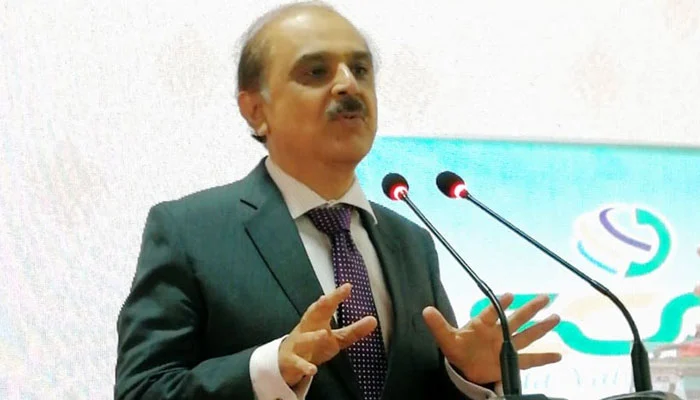Mohyuddin Wani
ISLAMABAD, May 20 (APP):Ministry of Federal Education and Professional Training Secretary, Mohyuddin Ahmad Wani on Monday highlighted the crucial role of Information Technology (IT) and digitalization in achieving progress and development in the current era.
Speaking at the National Launching Workshop for “Internet Dost and Internet Zabardast,” organized by the National Rural Support Programme (NRSP) with support from Google.org, Wani underscored that accurate data collection regarding out-of-school children, educational facilities, and health services was unattainable without relying on IT.
The secretary said that the ministry had decided to establish state-of-the-art IT labs in schools in the federal capital to equip youth with the latest skills and increase their employment opportunities.
He said that schools in the federal capital had been upgraded, providing students with the best facilities.
“We are committed to providing the best educational facilities to students in government schools,” he said.
“Our commitment extends beyond the classroom; it’s about creating an ecosystem where every child receives an education that prepares them for the challenges of the modern world. The goal is to erase disparities between government and private education standards,” he added.
He asserted that with determination, every challenge could be managed, and the government was dedicated to providing top-quality education in government schools.
The secretary also said that, alongside academic improvements, gym and sports facilities, as well as self-defense classes, would be provided to the students.
He said, the federal government had launched an initiative to provide free lunch meals to primary students in government schools in Islamabad to enhance child growth and encourage schooling.
In the first phase, about forty elementary schools will receive healthy, quality, and hygienic free meals.
CEO of the National Rural Support Programme (NRSP), Dr. Rashid Bajwa, highlighted that the “Internet Dost, Internet Zabardast” initiative would cover 48 districts across all four provinces—Punjab, Khyber Pakhtunkhwa, Sindh, and Baluchistan—as well as Gilgit-Baltistan and the Federal Capital Islamabad by July 2025.
The initiative will directly benefit over 103,500 underserved women, youth, parents, teachers, and children, aiming to bridge the digital gap and address gender and geographical disparities.
Dr. Bajwa emphasized the government’s commitment to ensuring the safety and security of internet users, particularly the youth.
He noted that Google had introduced the “Safe Internet” concept in Pakistan, focusing on students and children.
“In today’s digital age, access to information and connectivity are fundamental rights that enable individuals to thrive in an increasingly interconnected world,” Dr. Bajwa stated, stressing the importance of promoting digital literacy equally among educational institutions and rural communities.
He highlighted the project’s significance in empowering rural females and children through digital development.
Dr. Kyle Gardner, Government Affairs and Public Policy Lead for South Asia at Google, remarked that the digital literacy initiative aligned with Pakistan’s international commitments, including the Sustainable Development Goals (SDGs) and Vision 2025.
“It serves as a direct contribution to SDG 4 (Quality Education), SDG 5 (Gender Equality), and SDG 8 (Promote economic growth, employment, and decent work),” he added.
Dr. Gardner elaborated that targeted interventions and educational initiatives aimed to equip marginalized communities with the skills and knowledge to navigate the online world responsibly and safely.
“By promoting digital literacy in educational institutions and communities, we aim to empower our youth to harness the full potential of the internet while safeguarding their well-being,” he concluded.
Mohammad Arshad, Director General of the Ministry of Human Rights, informed participants that leveraging technology focused to unleash the immense potential of youth and entrepreneurs, positioning Pakistan as a global hub for innovation and digital entrepreneurship.
“Initiatives such as the ‘Internet Dost, Internet Zabardast’ project align seamlessly with our vision to leverage digital solutions for socioeconomic development and poverty alleviation, especially regarding Human Rights awareness,” Arshad added.
Musharraf Ali Farooqi, Founder and CEO of STORYKIT, also highlighted the significance of “Internet Dost, Internet Zabardast,” terming it the start of a revolution for rural communities, women, youth, and children.
